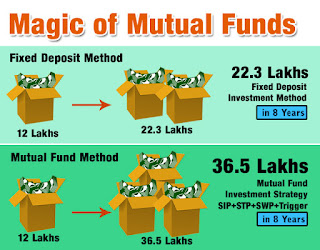Your first job
So you are 20 plus and after finishing your study you land
up in your first job (may be in your dream company) happily. Soon your first
salary is credited into your account making you super happy. As the time passes
you start noticing the provisional income tax being deducted from your salary
and in a way you get frustrated. You think you have just started earning and a
considerable amount is going directly to the govt. Also the money you get you
prefer to spend on various activities of your interest and the entire
amount is spent very soon. Correct? And then you eagerly await for the next
salary… where one should realise the importance of saving some amount regularly.
(image source google images)
Why saving is important?
Everything is going well for now. Now think about your needs
as you grow further, yes, up to your retirement. Are you sure that the economic
condition would always remain the same? Are you sure that no unforeseen
circumstance would happen in your life? Are you OK with the current deduction
of tax in your salary? No, right? That’s why saving some portion of your salary
becomes important, and it’s not difficult if you just apply some limit to your
(unnecessary) expenses. It is said that one should set aside about 20-25% of
your salary aside for saving. Not a big deal right?
There are various avenues of saving money like fixed
deposits, PPF, NSC etc., one of them is equity mutual funds. I’ll explain what these
are, how to invest and its benefits in simplest words.
Mutual funds
Think about fixed deposits. You give money to banks, they
promise a fixed interest rate and give you principal and interest at the time
of maturity. Everything is certain in this, but what if you come to know you
could earn a lot more if you had invested the money through mutual funds?
There are several businesses going on in the country. They
need money to grow. They can get money by borrowing from banks or public on a
fixed rate, or they can offer you (the money holder) to be the part of their
business and promising the share in the profits they earn, instead of repaying the loan.
Mutual funds are headed by experienced people (called fund
managers) who know which business is going to be profitable and for how much duration
(by their calculations and experience, though it’s not that certain but they
are professionals). These mutual funds (called equity mutual funds) become part
of the businesses they choose based on their outlook, and become shareholders
in them, by giving them the money. So when the company grows their share amount also grows in equal ratio
and profit is gained, which is distributed to the investors (like you). No, this
is not always certain, but no pain, no (additional) gain, right? From past
experiences, it is seen that they have returned 50% and more as well (though nobody can claim
certainty about future) in some durations.
(image source google images)
As a tax saving instrument
That was about saving. Lets see how good it is as a tax saving instrument. Other tax saving deposits need you to lock in your money
from five years to 15 years. But the tax saving mutual funds called Equity
Linked Savings Scheme (ELSS), offer good returns plus the lock in period of
only three years. So you CAN take the money out of them after three years only
along with returns with no upper limit. So high returns plus tax savings is a double benefit isn't it?
(image source google images)
Handling risk
No one can be sure how market will behave therefore there is
risk involved in investing in equity mutual funds. However as a general
observation, from medium to long term (three years and more), almost all mutual
funds offer good returns. Any return above 10% can be considered good. When the
market is going down, wise fund managers either opt out of investments or buy
more shares at low prices as they deem fruitful so they earn even more when the
market bounces back.
(image source google images)
Experience suggests that given the scenario one should not
completely rely ONLY on mutual funds despite of offering good prospects. Distribute
your money in all the saving instruments including mutual funds (called
diversification) to reduce the risk of loss.
How to choose and invest in equity mutual funds?
There are two ways to invest- one is through a financial advisor and
other Directly through the mutual fund. For the first method the advisor takes
his fee and suggests how much to invest and where? Other method relies on the
investor, who does research on his own. That’s not a huge effort. There are
plenty of sites to help like valureresearchonline, moneycontrol etc. By
investing in Direct plans the involving costs is less thus the return is
higher. Both the methods involve an initial KYC process and then one can invest
the amount one wishes. There is a good option in which some amount can be
invested each month to the mutual fund, called Systematic Investment Plan
(SIP).
There is a lot to cover in this topic but I believe this
would have helped the reader to understand the mutual funds. More to come!





No comments:
Post a Comment